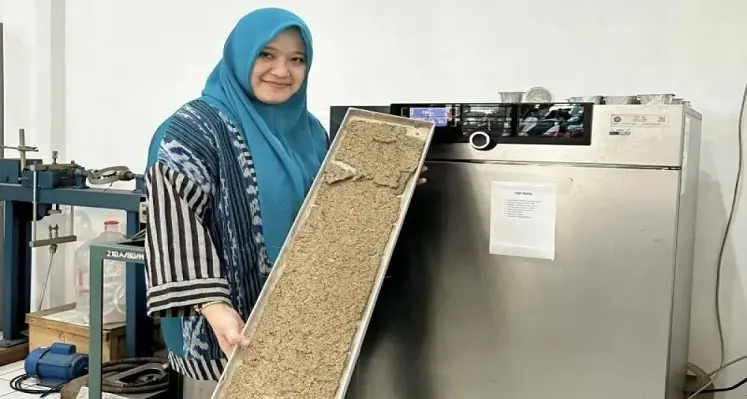An organic mulch tape developed by Dr Rita Parmawati, a lecturer from the Faculty of Agriculture of Brawijaya University has helped suppress weed growth, while also reducing soil surface evaporation rate
The mulch tape is made from banana waste, water hyacinth and paitan leaves. According to Dr Parmawati, the new technology will be applied at the start of the second planting season in Malaka District, East Nusa Tenggara (NTT), where an abundance of banana waste can be found. Mulch tape offers a myriad of benefits which include suppressing weed growth and reducing surface evaporation by up to 40%. Moreover, sun exposure enables the organic mulch to decompose into fertiliser.
The mulch tape application process is currently being carried out on a laboratory scale and is at the socialisation stage with the Regent of Malaka Regency, several farmer groups, and heads of departments in Malaka District. According to data from Statistics Indonesia (BPS), Malaka District experiences low agricultural growth, with rice productivity in the area decreasing from 2020-2022 due to issues in the supply of rice seeds as well as other problems involving weeds, evaporation, soil temperature, and irrigation systems.
Dr Parmawati explained why organic mulch tape is an efficient substitute for plastic mulch which is considered environmentally unfriendly due to its inability to decompose. "The disadvantages of using plastic mulch are reduced plant growth and yields, increased pest attacks, greater microplastic contamination, waterlogging, loss of soil structure, and reduced activity of soil microorganisms," Parmawati said.
She further highlighted that they would be going to the district at the end of July where they would be working with the PT Widjaya Teknik Indonesia (Witech) factory to make mulch tape for 10 hectares of land. Moreover, they would also be lending a hand to the local community with organic mulch tape preparation, starting with the introduction of materials, chopping, making tape pulp, drying, and pressing.




